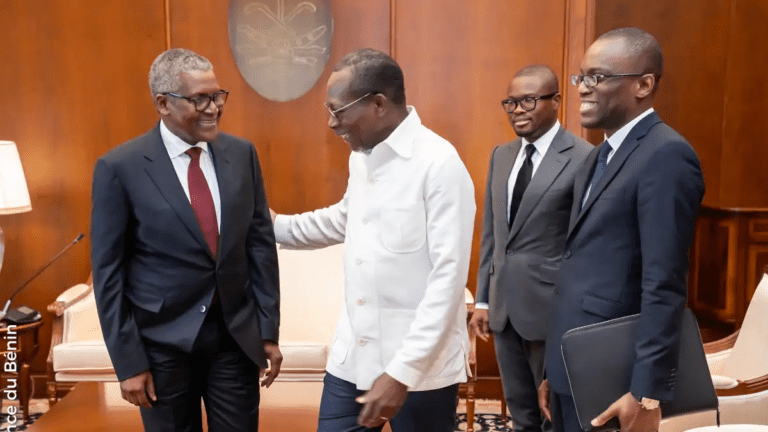APA – Cotonou (Benin) – The two countries have grown closer since Bola Tinubu came to power.
Africa’s richest man was in Cotonou, Benin last Wednesday. Aliko Dangote met Patrice Talon for a meeting that lasted several hours, but nothing leaked from these exchanges. The following day, the Beninese presidency issued a terse two-sentence press release announcing the visit of the wealthy Nigerian businessman.
This visit has caused quite a stir in Benin, because since coming to power in 2016, the Beninese president has not had an easy time with the Buhari administration. Many believe that a wind of thaw is blowing through relations between Abuja and Cotonou.
Tinubu, the main architect of the warming of relations between Abuja and Cotonou
For Marcel Zoumenou, managing editor of the daily “La Nouvelle Tribune,” Dangote’s visit to Cotonou is a sign that the new Nigerian president, Bola Tinubu, wants to normalize relations between his country and its small neighbor, Benin. No one knows exactly what Patrice Talon and Aliko Dangote discussed during their talks,
according to the journalist, who believes that it was certainly a question of seeing how the Nigerian businessman can do business in Benin. Mr. Zoumenou recalls that Dangote blamed the Beninese authorities for preventing him from developing his business in the country. The journalist notes that, in particular, he wanted to expand
the activities of his cement plants in Benin, and he also wanted to use Benin’s roads to transport his products to Togo and Ghana. He quarreled with Patrice Talon’s government because he didn’t agree with
Cotonou’s conditions.
Marcel Zounmenou recalls that in addition to Dangote, Mike Adenouga, another Nigerian billionaire and promoter of cell phone operator Globacom, had problems with Talon’s government, which led to the
cessation of his activities in Benin. The analyst believes that these troubles of Nigerian businessmen with Beninese authorities led the Buhari administration to decide to close Nigerian borders with Benin in August 2019. In December 2020, there was a partial reopening of these land routes between the two countries, but activities did not really resume. However, after Bola Tinubu came to power at the end of May 2023, a wind of normalization of relations seems to be blowing across the two countries.
The two presidents have met on several occasions in an attempt to iron out differences. First, Patrice Talon attended the inauguration of the new Nigerian president. The two personalities then met in Paris at the
end of June 2023 on the sidelines of the New Global Compact Financing Summit in Paris. On July 07, Talon paid a so-called courtesy visit to Tinubu in Abuja. Two days later, the two heads of state met again at the Economic Community of West African States (ECOWAS) summit in Bissau. For Marcel Zoumenou, President Bola Tinubu is the main architect of the gradual return to normal between Cotonou and Abuja. He believes that this is a good thing for the economies of the two countries, which are closely linked.
One of the concrete signs of the restoration of relations between the two countries is the complete reopening of Benin’s land borders to imports of vehicles and other goods from Benin and other West African states. This was decided by President Tinubu on June 21, 2023. This measure had been in force since the closure of the borders in August 2019.
As Nigeria’s ports were very congested, many Nigerian economic operators were using the port of Cotonou to transit their goods. For importers of used vehicles in Benin, Nigeria was the main market before the closure of the borders in 2019. The Buhari administration blamed the Beninese authorities for letting contraband invade the
Nigerian market.
A return to normalcy that will certainly relieve the economies of both countries
Benin’s economy has been linked to Nigeria for decades. To illustrate this point, economist Olivier Allocheme recalls a popular saying in Cotonou that “when Nigeria coughs, Benin sneezes.” However, for analyst Allocheme, Benin doesn’t benefit from this relationship any more than its large neighbor. He points out, for example, that the
re-export economy that Cotonou has developed to take advantage of the Nigerian market is controlled by Nigerian economic operators. “We’ll say that Benin is in the re-export business, but the people doing the
re-exporting are actually Nigerians,” says Dr. Allocheme.
He maintains that Nigerian economic operators have suffered greatly from the closure of borders, because they had much to gain by unloading their goods in the port of Cotonou and sending them by road to Nigeria. “Instead of wasting several weeks in Nigeria’s often congested ports, they prefer to go through the port of Cotonou and transport their goods overland, which is more profitable for them because, under the ECOWAS agreements, they don’t pay customs duties,” he explains.
Dr. Olivier Allocheme also notes that when Nigerian traders come to Benin, it’s in the hope of buying foreign currency, which isn’t easy in their country. “They manage to exchange their nairas for dollars and euros, which is not easy in their country, because the circulation of foreign currency is tightly controlled by the Central Bank of
Nigeria. As a result, Benin is doing Nigerian economic operators a huge favor in terms of foreign exchange,” he explains. For this economist, it is in both countries’ interests to strengthen their cooperation for the good of their economies.
RK/ac/fss/abj/APA


